Introduction: In this article, Melissa Davenport Berry continues her series on Mayflower descendants, with a special tribute to fallen heroes to commemorate Memorial Day. Melissa is a genealogist who has a website, americana-archives.com, and a Facebook group, New England Family Genealogy and History.
Today I continue my series on “Mayflower Descendants: Who’s Who,” with a special tribute to fallen heroes to commemorate Memorial Day.
Here is a photo of the New Plimmoth Gard, a group of historical reenactors portraying the militia of Plymouth Colony, 1621-1646. Their aim is to promote knowledge and understanding of early colonial society and the importance of military preparedness.
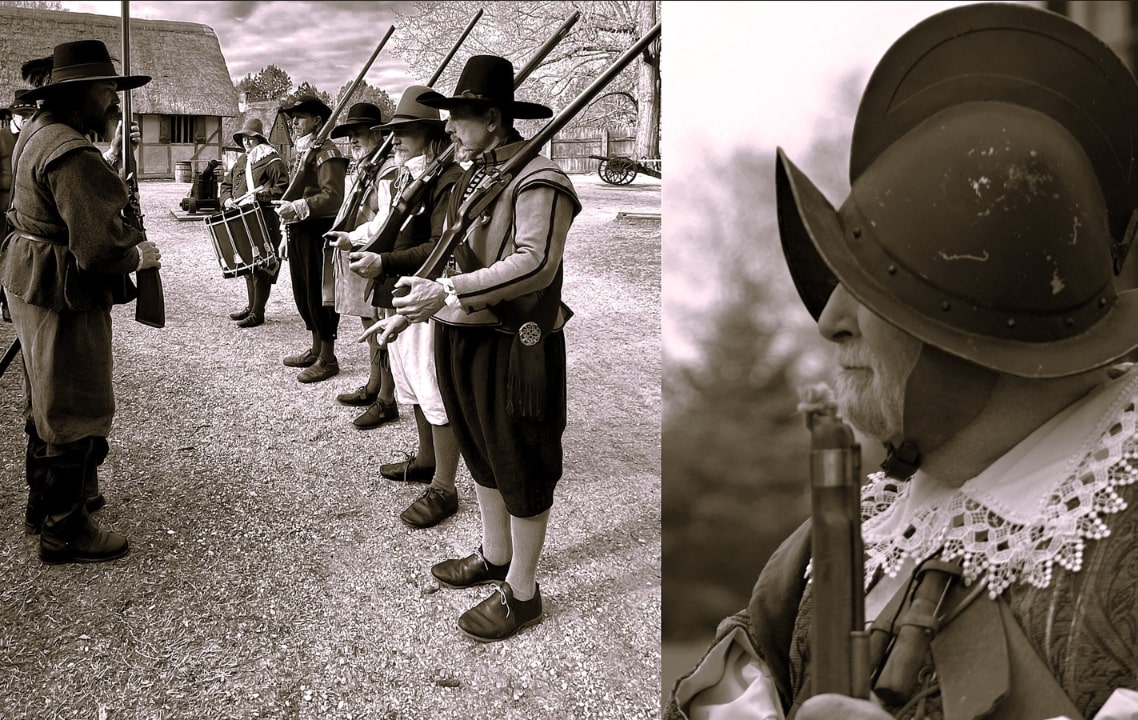
The subject for today’s story is 1st Lt. Walter Alvin Blair (1922-1943), United States Army Air Force, 351st Bomber Group, Heavy, 511th Bomber Squadron, a direct descendant of Mayflower passenger Richard Warren. Walter gave his life fighting for his country.
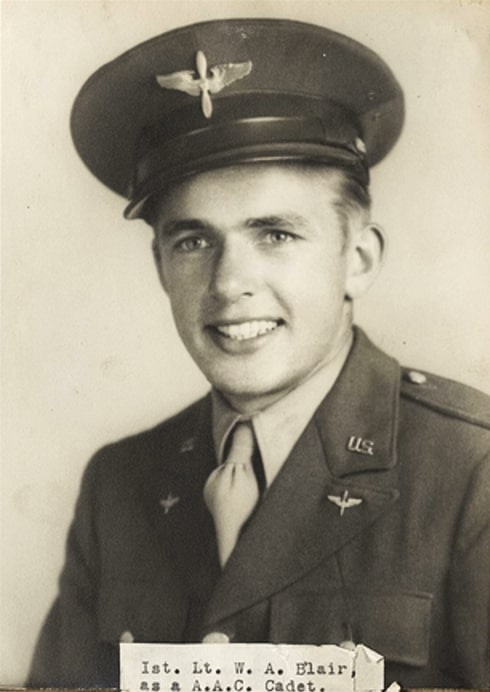
Lt. Blair was born in Brisbane, California, the only son born to Linwood Dorr and Vera (Lunerom) Blair, and left no issue – but there are many cousins who share his lineage.
Lineage:
- Richard Warren and Elizabeth Walker
- Ann/Anna Warren and Thomas Little
- Hannah Little and Stephen Tilden
- Joseph Tilden and Joanna Bowles
- Jonathan Tilden and Mary Ruck
- Joanna Tilden and Jothan Moulton
- Abigail Ruck Moulton and Samuel Main/Mains
- Wealthy Moody Main and Levi Crocker
- Levi Robertson Crocker and Mary W. Trufant
- Mariam Trufant Crocker and Daniel H. Wakefield
- Harriet A. Wakefield and Alvin C. Blair
- Linwood Dorr Blair and Vera A. Lunerom
- Walter Alvin Blair
Linwood Dorr Blair (1893-1956), aka “Sarge,” was also a military man. He served in Co. M, 27th U. S. Infantry, nicknamed the “Wolfhounds.” He is in uniform in the photo below with his wife Vera (Lunerom) Blair (1901-1970), taken in Manila, Philippine Islands, in 1920.
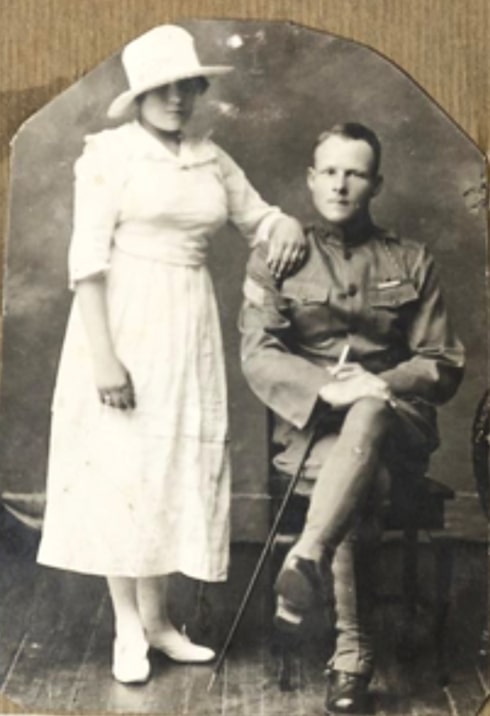
The “Sarge” created a training program known as “Blair’s Rangers” to honor the memory of his son and to prepare young girls and boys in the way of serving in the United States military. Many benefited from this training during the Korean and Vietnam wars.
Two scrapbooks of “Blair’s Rangers” are housed at the Brisbane Library, and many of the photos from this collection tell a story of true patriotism and how the Blair family transformed their grief into service to their country.
From an early age, Lt. Walter Alvin Blair was a model patriot and soldier-in-waiting. In the photos below, he is seen: (left) saluting on his 5th birthday sporting military gear; in the middle photo taken in 1932, age 10, Blair was a Ranger skilled in the art of warfare; the photo on the right was taken in 1940 at age 18 after enlisting in the Air Force.
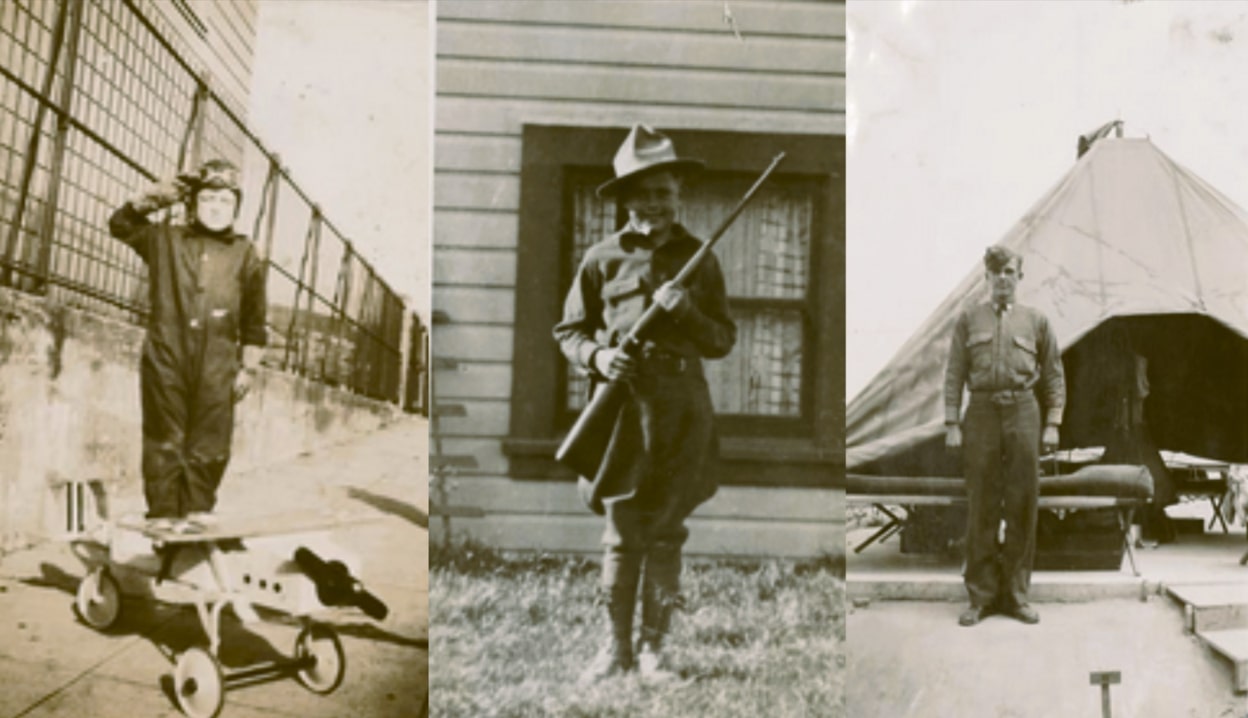
Lt. Blair was on the crew of the B-17G #42-5807 “Rikki Tikki Tavi” AKA “Minor Ball” during a mission to Frankfurt, Germany, on 4 October 1943.
Their target was an aviation factory. On the return trip back to base, they were attacked by enemy fighters and hit. They crashed near Ellewoutsdijk in Holland with no survivors, and only two bodies of the crew ever recovered. For all the casualties that day see: HonorStates.org
Here is a newspaper clip announcing Lt. Blair’s death.
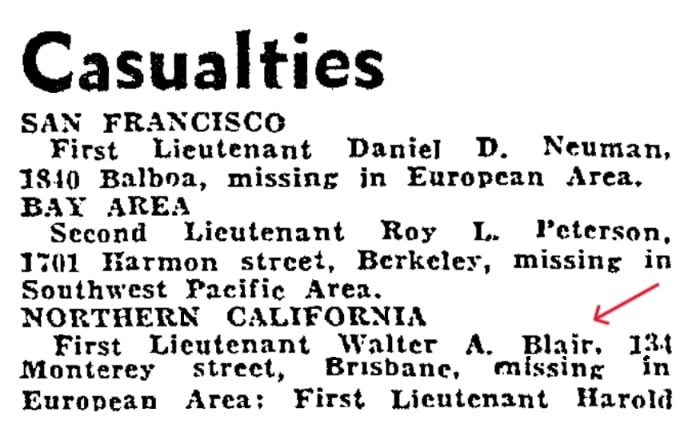
In late January 1944 Lt. Blair was awarded the Air Medal and two Oak Leaf Clusters for destruction of an enemy plane over Europe and for 10 combat missions.
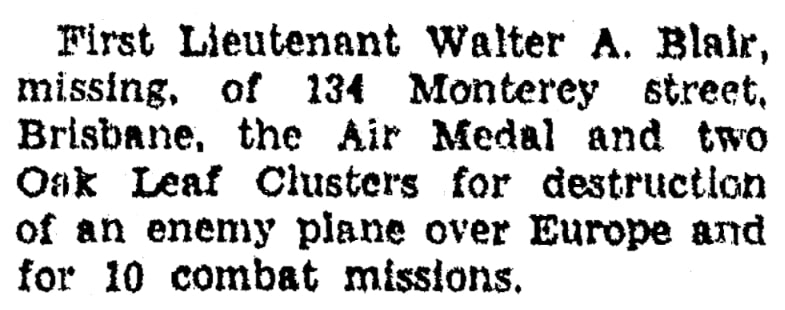
His father “Sarge” Blair received these medals in his place during a ceremony on 30 January 1944.
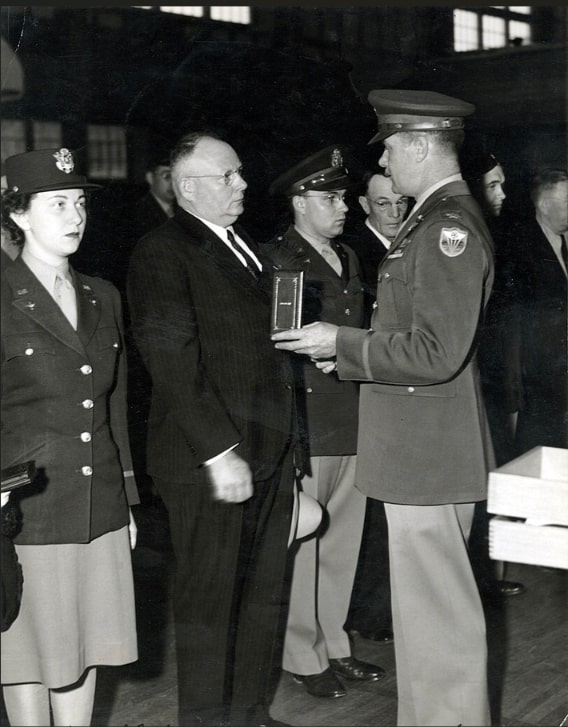
Lt. Blair was one of Brisbane’s first heroes of WWII at the age of 20, and his bravery and courage are remembered every Memorial Day.
“Sarge” and his wife Vera set up a memorial outside their home for their son and other fallen soldiers, which was also the main headquarters for his rangers.
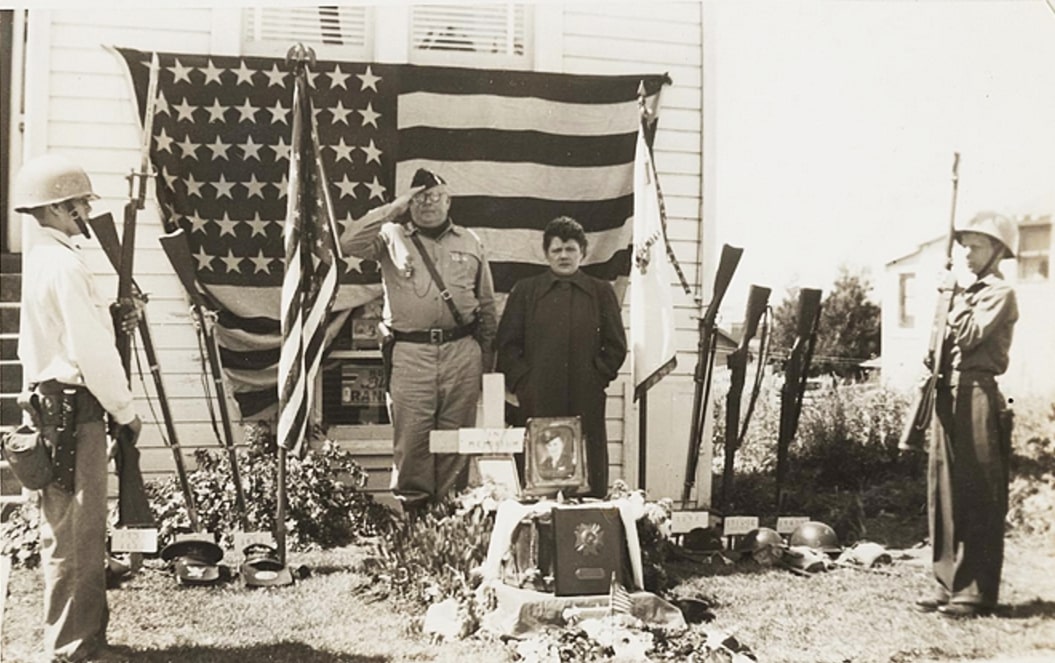
In this next photo, “Sarge,” Vera, and his rangers are shown at the installation of the Walter A. Blair V.F.W. Post 9769 on 3 April 1946.
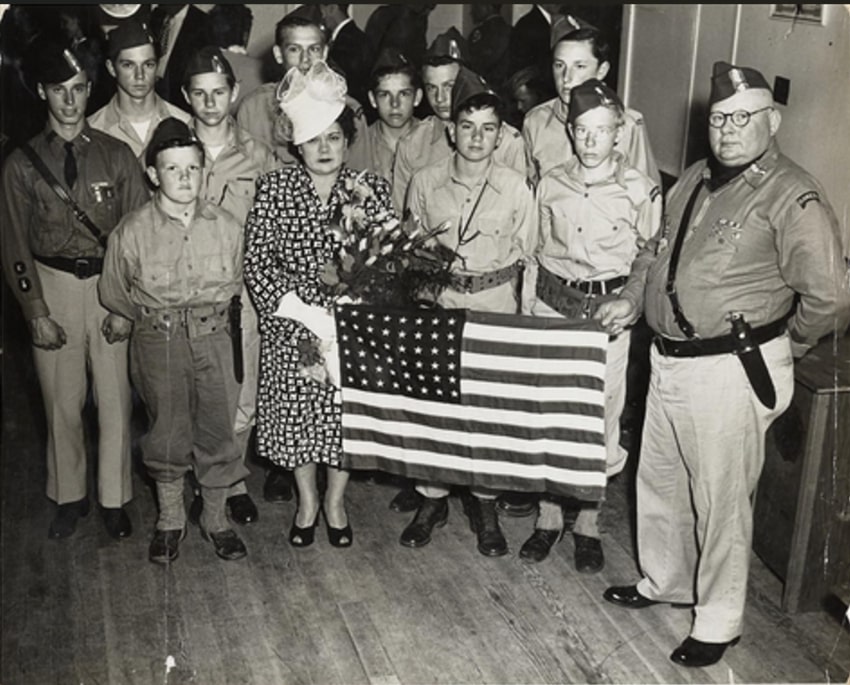
According to “Memory of Sarge’s Rangers Still Lingers in Brisbane,” by Lola Garcia, when Linwood Blair organized “Blair’s Rangers” (composed of boys and girls ranging from age 9 thru 17), “Sarge” asked for only one requirement: that each starting ranger could lug a nine-pound rifle and a full field equipment bag.
One special part of the unit that worked right alongside “Sarge” was PFC “Tike,” a Springer Spaniel, who refused to surrender his position in the lead. He can be seen in the photos below with the rangers.
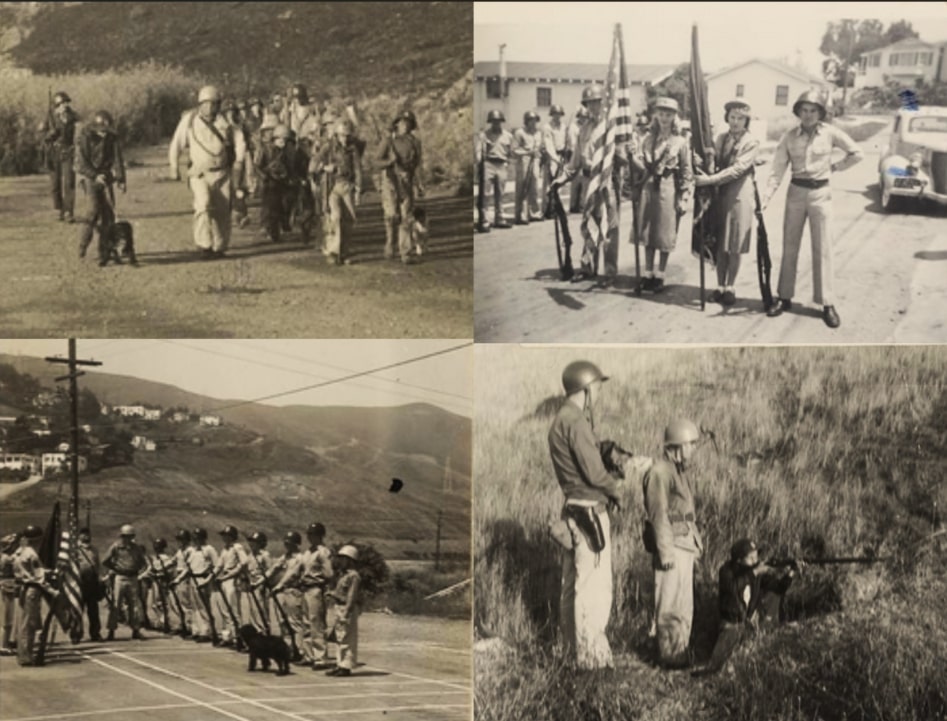
Blair assembled his rangers twice a month to do a two-mile trek along the Bayside Highway to a grove of Eucalyptus trees while singing, “Sound Off (The Duckworth Chant).”
Below is a page from the scrapbook of “Blair’s Rangers” showing rangers who completed “Sarge’s” program and went on to enlist in the military. I ask readers to share any additional information.
This page includes: Robert Herbert Tann (1931-2001), son of Herbert Wellington and Margaret Elizabeth (Gibson) Tann, served in the U. S. Marines in both the Korean and Vietnam wars and was awarded the Purple Heart; Bill Hatch, gunner, U. S. Air Force; Captain Banner/Bonner, awarded a Purple Heart and Bronze Star, Korean and Vietnam wars; Sgt. D. Walton, Korean Vet; Sgt. E. Maxwell, Korean War; ? Brown, U. S. Navy, Korean War; 1st Sgt. Anthony D. Souza, U. S. Marines; Sgt. John Sweet, Korean War; and Anthony D. Souza in uniform.
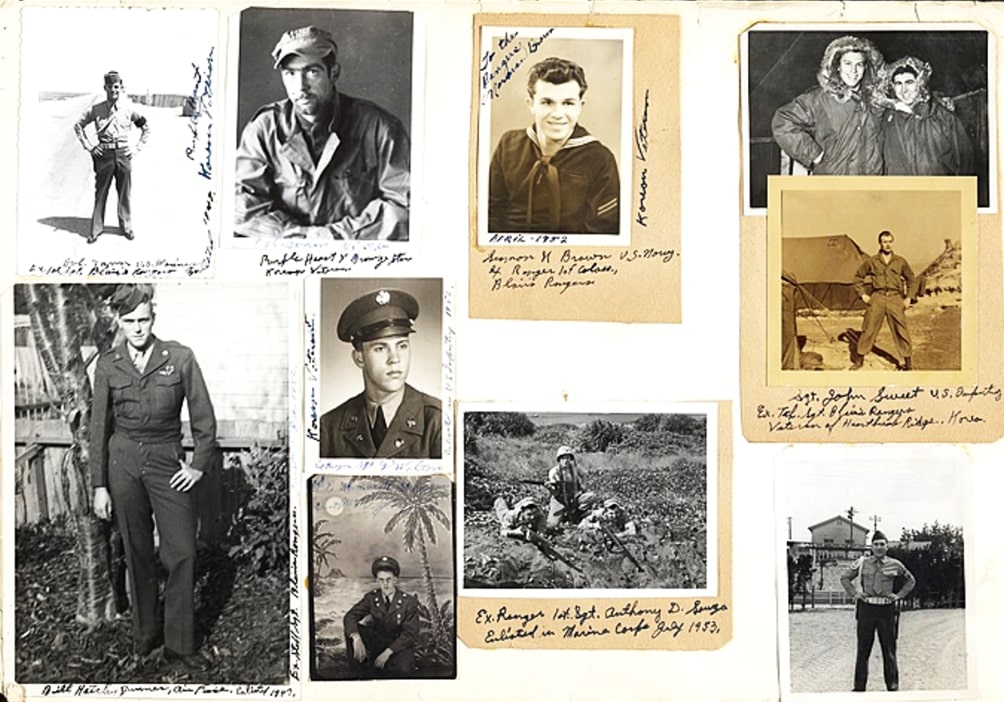
The “Blair’s Rangers” program taught many young people about service principles, along with their duties and responsibilities. Numerous testimonials highlight the significant influence this guidance had on their lives – and in many cases spared them from death.
To be continued…
Explore over 330 years of newspapers and historical records in GenealogyBank. Discover your family story! Start a 7-Day Free Trial
Note on the header image: “Mayflower in Plymouth Harbor,” by William Halsall, 1882. Credit: Wikimedia Commons.
